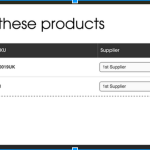
This weekend is sales tax free. But not-so-long ago, in a galaxy not-so-far away…
The Sales Tax Wars. For the past couple of years following the destruction of the Marketplace Fairness Act (MFA), the ecommerce alliance has flourished with all signs indicating continued growth. In 2013, the Marketplace Fairness Act — a bill aiming to require online businesses to charge sales tax — was introduced and shut down by the House of Representatives. But the empire intends to strike back. In an act of vengeance, MFA re-emerged last March, and a very similar bill called the Remote Transactions Parity Act (RTPA) arrived on the scene earlier this summer in June as well.
Reconstructing the Death Star
It’s no surprise that many ecommerce entrepreneurs are opposed to the MFA and RTPA; nobody enjoys taxes. In any case, the bill was revamped, and it’s fully armed and operational if it passes through Congress. So, let’s take a look at what exactly both bills entail. As with anything related to taxes, understanding them is as difficult as making the Kessel Run in 12 parsecs, but below is a concise description of what matters to most merchants.
Here are the Marketplace Fairness Act’s (MFA) basics:
- Sellers grossing $1,000,000 in out-of-state sales per year must collect sales tax from buyers in states that impose it
- If a merchant makes a sale in a state where they have no physical presence, it’s an out-of-state sale
- Certain products will have specific taxes, depending on state tax code
- Sellers will have to comply with each state’s tax code if they make a sale there
Remote Transactions Parity Act (RTPA) is very similar, but differs in the following:
- Businesses making $10 million or less in the first year are exempt from the online sales tax
- In the second and third year, businesses making $5 million and $1 million or less respectively are exempt
- There is no exemption from the sales tax after four years
- But any sellers using an electronic marketplace are entitled to no exception at any point, regardless of revenue
I would say that all taxes are evil, but only a Sith deals in absolutes. But the supposed upside to both bills is that the playing field between online stores and brick & mortars (who usually must enforce a sales tax) is fairer. MFA and RTPA are also sensitive to small businesses, with the former exempting them entirely if they make less than one million. Plus, it’s more money for state governments at the end of the day.
Back to you, though. Let’s look at what the two may mean for your ecommerce store.
The Phantom Margins
While $1,000,000 may seem like a massive amount of money, it’s revenue, not profit. Many, many merchants operate on scarily slim margins, constantly weighing their costs versus the revenue from their sales. Keeping costs down suggests cutting wherever feasible, and a big area for that is through shipping.
In the event that the government passes either bill, affected merchants are likely to change their prices once the tax goes live. And seeing the final cost of an marked up product has the potential to terrify consumers, launching them to abandon their carts as quickly as jumping to hyperspace.
To adjusting for that reaction, merchants can try lowering the customer’s shipping costs as much as possible, and a big part of that is through low, cost-effective shipping rates. If you’d like, test drive our own shipping rate calculator through USPS to see exactly how much you could save.
Another avenue for reducing shipping costs is through packaging. All shipping services price by weight and dimension, so selecting the proper packaging is essential, whether you’re trying to use lightweight protection or compact containers. And if you prefer that all matters related to shipping disappear entirely like Jar-Jar Binks, options like just-in-time (JIT) and outsourced warehouse fulfillment are on the table.
A Not-So-New Hope
The good news is that shipping and inventory management systems are out there to support a businesses’ multichannel efforts, which are bound to be hit the hardest by any one of these bills passing. Because such tools are able to connect with most channels out there, online retailers are able to get a clearer, comprehensive view of their financial situation, and they’re better able to analyze their back-office costs. All of this adds up to calculating margins more effectively.
Even more importantly, it’s possible for multichannel management tools to integrate with tax and accounting software to provide access to a business’ data. Linking the two helps ease up on the time consuming, mind melting chore of dealing with taxes and accounting. It’s already a highly sought after feature of many order management tools, and, if either of the two bills survive, a tax and accounting software integration is that much more important.
But keep in mind that this is just food for thought at this point. Who knows if the two bills will actually pass. There’s a good chance they’ll float around Congress for quite some time, just like the two moons on the useless desert planet of Tatooine. If you want to read more in-depth about the bills, check out this comparison of the MFA and RTPA by National Law Review. For more information on RTPA look here, and for specifics on the MFA look here.


